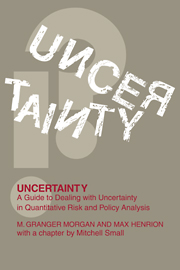Book contents
- Frontmatter
- Contents
- Preface
- 1 Introduction
- 2 Recent Milestones
- 3 An Overview of Quantitative Policy Analysis
- 4 The Nature and Sources of Uncertainty
- 5 Probability Distributions and Statistical Estimation
- 6 Human Judgment about and with Uncertainty
- 7 Performing Probability Assessment
- 8 The Propagation and Analysis of Uncertainty
- 9 The Graphic Communication of Uncertainty
- 10 Analytical A Software Tool for Uncertainty Analysis and Model Communication
- 11 Large and Complex Models
- 12 The Value of Knowing How Little You Know
- Index
12 - The Value of Knowing How Little You Know
Published online by Cambridge University Press: 05 June 2012
- Frontmatter
- Contents
- Preface
- 1 Introduction
- 2 Recent Milestones
- 3 An Overview of Quantitative Policy Analysis
- 4 The Nature and Sources of Uncertainty
- 5 Probability Distributions and Statistical Estimation
- 6 Human Judgment about and with Uncertainty
- 7 Performing Probability Assessment
- 8 The Propagation and Analysis of Uncertainty
- 9 The Graphic Communication of Uncertainty
- 10 Analytical A Software Tool for Uncertainty Analysis and Model Communication
- 11 Large and Complex Models
- 12 The Value of Knowing How Little You Know
- Index
Summary
“As for me, all I know is I know nothing.”
Socrates, Phaedrus, sec. 235An awareness of the limitations of one's knowledge has long been recognized as an important aspect of wisdom. Socrates went so far as to maintain that his wisdom consisted solely in his recognition of the extent of human ignorance in his attempt to explain why the Delphic oracle had pronounced him wisest among men. While it may be easy to admit the virtue of this “Socratic wisdom,” it seems less easy to maintain a full consciousness of it when engaged in practical decision-making.
As discussed in Section 4.2, the development of the personalistic or Bayesian theory of probability (Savage, 1954; de Finetti, 1974) provides a way for us to conceptualize some kinds of ignorance by characterizing our degrees of uncertainty in terms of subjective probabilities. Bayesian decision theory builds on this to provide a conceptual framework for explicitly incorporating our uncertainties about our information in the process of making decisions. The art of decision analysis that has sprung from this theoretical work offers a range of techniques intended to make these developments applicable for practical decision-making, at least for those decisions worth systematic attention. To the extent that we can capture our opinions of the limitations of our knowledge by subjective probability distributions over the quantities we are uncertain about, decision analysis appears to provide a way of operationalizing this Socratic precept.
Information
- Type
- Chapter
- Information
- UncertaintyA Guide to Dealing with Uncertainty in Quantitative Risk and Policy Analysis, pp. 307 - 324Publisher: Cambridge University PressPrint publication year: 1990
